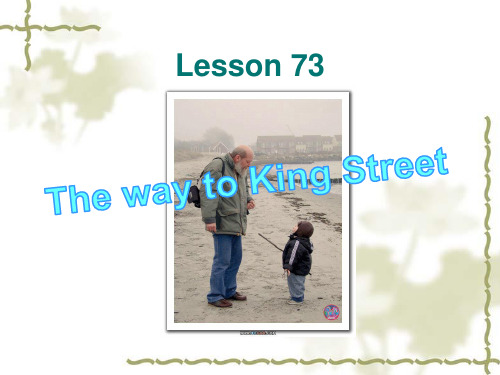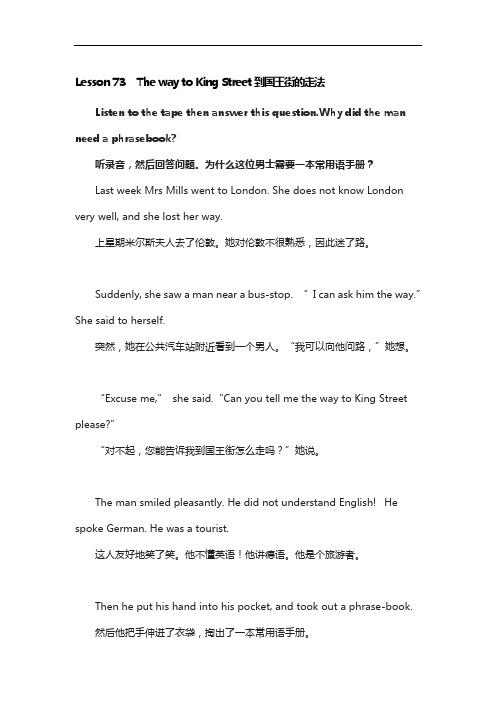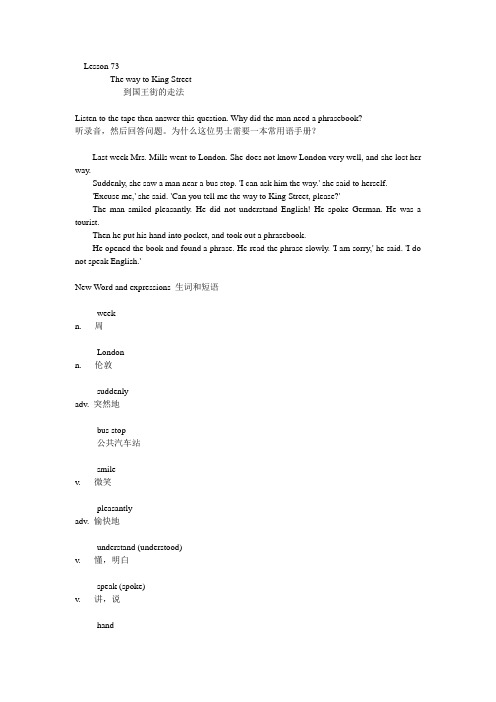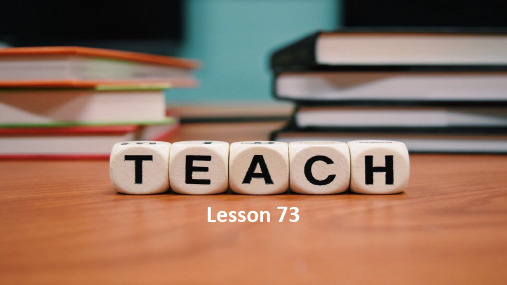新概念第一册Lesson 73-74课
新概念第一册Lesson-73-74完整版

2021/5/3
新概念第一册Lesson-73-74完整版
9.can 能够 • 结构: • 情态动词+动词原形
变疑问句时情态动词 提前
eg:I can sing. → Can you
sing? He can swim.
→ Can he swim?
2021/5/3
新概念第一册Lesson-73-74完整版
phrasebook?
新概念第一册Lesson-73-74完整版
Last week Mrs. Mills went to London. She does not know London very well,
and she lost her way.
新概念第一册Lesson-73-74完整版
Suddenly, she saw a man near a bus stop. 'I can ask him the way.' she said to herself.
this week, last week, (前面不能加介词) the week before last 上上周 the week after next 下下周
新概念第一册Lesson-73-74完整版
★ London /'lʌndən/ n. 伦敦 英国的首都
2021/5/3
新概念第一册Lesson-73-74完整版
(3)speaking Frankly speaking 坦率地说 generally speaking 一般地说 strictly speaking 严格地说 eaxactly speaking 确切地说
新概念第一册Lesson-73-74完整版
★ hand /hæ nd/ give sb a hand
新概念英语第一册73-74课课件(64张PPT)

❖ 9.He opened the book and found a phrase.
❖ 找到,(找的结果。)
❖ find-found-found
❖ look for . ❖ 找的过程。 ❖ Eg :我正在找我的书,然后我找到它
了。 ❖ I am looking for my book,and then
在她脸上有温暖的微笑。
She had a warm smile on her face.
laugh 大笑 嘲笑
laugh at
★understand (understood understood) v. 懂,明白 v. 理解;懂白;明了;了解;得知 我不明白你的意思。 I don’t understand what you mean.
专心于 ❖be lost in 迷恋于,专心于
.
Speak-spoke-spoken
❖speak:说某种语言 ❖说英语
❖speak English ❖speak to sb.跟某人讲话 ❖Can I speak some English to you?
❖ speak ❖ 讲语言
❖ speak to sb about sth ❖ tell ❖ 告诉
❖eg:He asked the teacher a question.
❖ ask sb for sth向某人要某物 ❖我想妈妈要钱。
❖I ask mom for money. ❖ ask for it=ask for trouble自找麻
烦
4. She said to herself.
say-said-said say to oneself 心中暗想(不出声地) talk to oneself / think aloud 自言自语(小 声地) 反身代词:
新概念英语第一册73-74课

•
buy _b_u__y_s__ _b_o_u_g_h_t_ eat __e_a_ts___ _a_t_e____
•
get __g_et_s___ ___g_o_t __ walk __w_a_l_k_s_ __w_a_l_k_e_d
•
take _t_a_k_e_s__ _t_o_o_k___ dance _d_a_n_c_e_s_ _d_a_n__ce_d_
时态 一般 现在 时
一般 过去 时
用法
一般、 经常、 习惯、 真理
过去某 一时 间做了 某事
动词形 肯定 否定句
式
句
原形/ I do… I don’t 三单 He do…
do/does does… He
doesn’t
do …
过去式 I
I didn’t
did did… do…
He He
did… didn’t
The man smiled pleasantly.
He did not understand English!
do
He spoke German. He was a tourist.
speak
is
Then he put his hand into pocket,
put
and took out a phrasebook.
Lesson 73 The way to King Street
New words and expressions:
• week n.周 • London n.伦敦 • suddenly adv.突然地 • bus stop 公共汽车站 • smile v.微笑 • pleasantly adv.愉快地
新概念一册73-74课课件

v. ★ smile v. 微笑
She never smiles.她从来不笑。
n. She had a warm smile on her face. 她脸上露出亲切的微笑。
pk: laugh 大笑 laugh at 嘲笑
★ greet v. 问候,打招呼
She greeted me warmly.
▲tell意为“告诉,对…说”.告诉的内容 可以和to连用 作及 物动词,如: I can’t tell the bad news to you.
adv.
Suddenly, she saw a man near a bus stop. The man smiled pleasantly. He read the phrase slowly. He drank the water thirstily. I finished my homework hurriedly.
He opened the book and found a phrase. He read the phrase slowly. ‘I am sorry,’He said. ‘I do not speak English.’
❖ 6. then [adv.] 然后,于是,那么,表示过渡。
❖ We had dinner together, and then went to the concert.
Last week,Mrs Mills went to London.She does not know London very well,and she lost her way.
课文讲解
❖ 1.She does not know London very well,
and she lost her way.
新概念英语第一册第73-74课:The way to King Street

Lesson 73 The way to King Street到国王街的走法Listen to the tape then answer this question.Why did the man need a phrasebook?听录音,然后回答问题。
为什么这位男士需要一本常用语手册?Last week Mrs Mills went to London. She does not know London very well, and she lost her way.上星期米尔斯夫人去了伦敦。
她对伦敦不很熟悉,因此迷了路。
Suddenly, she saw a man near a bus-stop. “I can ask him the way.”She said to herself.突然,她在公共汽车站附近看到一个男人。
“我可以向他问路,”她想。
“Excuse me,”she said.“Can you tell me the way to King Street please?”“对不起,您能告诉我到国王街怎么走吗?”她说。
The man smiled pleasantly. He did not understand English! He spoke German. He was a tourist.这人友好地笑了笑。
他不懂英语!他讲德语。
他是个旅游者。
Then he put his hand into his pocket, and took out a phrase-book.然后他把手伸进了衣袋,掏出了一本常用语手册。
He opened the book and found a phrase. He read the phrase slowly. 他翻开书找到了一条短语。
他缓慢地读着短语。
“I am sorry,”he said. “I do not speak English.””很抱歉,“他说,”我不会讲英语。
新概念英语第一册73-74课课文详解、翻译及语法

Lesson 73The way to King Street到国王街的走法Listen to the tape then answer this question. Why did the man need a phrasebook?听录音,然后回答问题。
为什么这位男士需要一本常用语手册?Last week Mrs. Mills went to London. She does not know London very well, and she lost her way.Suddenly, she saw a man near a bus stop. 'I can ask him the way.' she said to herself.'Excuse me,' she said. 'Can you tell me the way to King Street, please?'The man smiled pleasantly. He did not understand English! He spoke German. He was a tourist.Then he put his hand into pocket, and took out a phrasebook.He opened the book and found a phrase. He read the phrase slowly. 'I am sorry,' he said. 'I do not speak English.'New Word and expressions 生词和短语weekn. 周Londonn. 伦敦suddenlyadv. 突然地bus stop公共汽车站smilev. 微笑pleasantlyadv. 愉快地understand (understood)v. 懂,明白speak (spoke)v. 讲,说handn. 手pocketn. 衣袋phrasebookn. 短语手册,常用语手册phrasen. 短语slowlyadv. 缓慢地参考译文上星期米尔斯夫人去了伦敦。
新概念一册L73-74课课件

put v. 放….(过去式 put) put......into 放进
take out 拿出 (take 的过去式 took)
5. Then he put his hand into his pocket, and took out a phrasebook.
2. Suddenly, she saw a man near a bus-stop. “ I can ask him the way.” She said to herself.
1.suddenly/ 'sʌdnlɪ / adv. 突然地=All of a sudden 2.see “看” (saw 过去式)see sb. do/doing sth. 3.herself (人称代词宾格her的反身代词) 4.say(said过去式) to oneself 心中暗想
4. The man smiled pleasantly. He did not understand English! He spoke German. He was a tourist.
smile v. 微笑 understand v. 懂,明白,理解 speak / spik / v. 讲,说 【speak +语言】
eg.It's hard to understand this book. 这本书很难懂。 eg.I don’t understand Italian.
understood (understand的过去式) eg.My grandmother understood Russian when she was young. 我的奶奶年轻的时候懂俄语。
新概念英语第一册(全套)Lesson73-74ppt

'Excuse me,' she said. 'Can you tell me the way to King Street, please?‘
8. Excuse me. 打扰一下,请问…(事前) I’m sorry. 对不起,很抱歉(事后)
9.tell sb. the way to, 告诉某人去……的路。
King's Road 国王街
New words and expressions:
• week [wi:k] n.周 • London ['lʌndən] n.伦敦 • suddenly ['sʌdnli] ad.突然地 • bus stop 公共汽车车站 • smile [smail] v.微笑 • pleasantly ['plezntli] ad.愉快地
6. ask sb. sth. 问某人某事。 eg:He asked the teacher a question.
7. say to oneself 心中暗想(不出声地) • talk to oneself 自言自语(小声地)
反身代词:myself, yourself, himself, herself, itself, ourselves, yourselves, themselves
eg: go to school, go to the museum. 注意:go home, go there(副前不用介) • 3. know sth./sb. very well 对什么东西或什 么人很熟悉。
• eg: I know Super Junior very well. I don’t know Korea very well
4. lose one’s way 迷路(丢失了某人的 路)。
- 1、下载文档前请自行甄别文档内容的完整性,平台不提供额外的编辑、内容补充、找答案等附加服务。
- 2、"仅部分预览"的文档,不可在线预览部分如存在完整性等问题,可反馈申请退款(可完整预览的文档不适用该条件!)。
- 3、如文档侵犯您的权益,请联系客服反馈,我们会尽快为您处理(人工客服工作时间:9:00-18:30)。
.God helps those who help themselves. 天助自助者。
How to ask the way:
• Can you tell me the way to ……? • How can I get to ……? • Where is ……?
10. ________ (be) your mother a sales assistant last year? No. she __________.
Read and change 1. Emma made the tea half a hour ago.
When did Emma make the tea? 2. The man under the tree lost his way to his hotel.
Come upstairs and see it. • 这里的and指的是“目的”
• 3.ask sb. sth. 问某人某事。 • eg:He asked the teacher a question. • ask sb for sth向某人要某物 • ask for it=ask for trouble自找麻烦
It is pleasant today. 给人好感的人
a pleasant person
She smiled a pleasant smile.
=She smiled pleasantly.
★understand (understood) ① v. 理解;懂 我不明白你的意思
v. 懂,明白
I don’t understand what you mean.
Who lost the way to the hotel? 3. Susan didn’t answer the call last night because she doesn’t like the awful guy.
4.
Why did she Lulu was washing
not her
过去 式
did
肯定句
I do… He does…
I did… He did…
否定句
一般疑问 句及其回 答
I don’t Do you like
do…
milk?
He doesn’t do …
Yes, I do.
I didn’t Did you
do…
drink milk?
He didn’t Yes, I did. do…
• 4.Excuse me. 打扰一下,劳驾,请问…(事前) • I’m sorry. 对不起,很抱歉(事后)
• 5.tell sb. sth. 告诉某人某事。Telltold-told
• 6.the way to… 去某地的路,去某地 的走法
• eg: the way to Ji’nan / the library/ the nearest post office
• lose one’s way 迷路 • Lose sight of 看不见 • Lose heart失去信心,泄气 • Lost weight减肥 • Lost oneself in沉迷于,迷恋于,专心于 • Be lost in 迷恋于,专心于
Fill in the blanks
• Suddenly, she
• 7.then [adv.] 然后,表示过渡。 • Can you tell me the way to the station? • And then I won`t lose my way if you
help me
• .8. put-put-put,take-took-taken • put… into… 把…放进…中去 • take…out of… 把…从…中取出 • eg.He took out a phrasebook. • = He took a phrasebook out of his pocket. • find-found-found • .read /ri:d/-read /red/ /-read /red • He read the phrase slowly. 这里的slowly是
Look and say
Listen to the tape then answer some questions. Where did Mrs. Mills go last week? Did she lose her way?
Do you know London well?
★lose v. (使)迷路,遗失,失去(lost—lost) ① v. 迷失;(使)迷路
特殊疑问 句及其回 答 What do you like? I like milk.
What did you drink? I dra I _________ (have) an exciting party last weekend.
2. What ______ Tom ______ (do) on Saturday evening? He ________(watch) TV and __________(read) an interesting book.
a man
a bus-shop.
“ I can ask the way.” She
to
.
Use a complete sentence to answer these questions.
• What did she say to him? • How did the man smile? • Did the man understand English? • What did the man do? • Did he speak English? • Was he English or a tourist?
• 3、say———一般着重讲话的内容,指有连贯性的说话, 通常用做及物动词。例如: I don’t know what he said.我不明白他所说的。
• 4、tell指把一件事情传达给别人或讲述一件事情、一个故 事等。常用做及物动词。 例如:When I was young, my mother often told me a story in the evening.
一个副词,修饰动作read。
Lesson 73 The way to King street
• 根据给出的关键词(key words)来描述图片!
Last week, Mrs. Mills, go to London she, not know the way, she , lost her way
一般过去时
基本结构:主语+动词过去式+其他; 否定形式①was/were + not;
②在行为动词前加didn‘t,同时还原行为动 词; 一般疑问句Did+主语+do+其他。
时态 一般现 在时
一般过 去时
用法 动词 形式
一般、 原形/ 经常、 三单
习惯、 do/do 真理 es
过去 某一 时
间做 了某 事
8. Jenny and Danny usually______(play) games in the afternoon .
9.My friend, Carol, ________(study) for the math test and ________(practice) English last night.
• say-said-said • say to oneself 心中暗想(不出声地) • talk to oneself / think aloud 自言自语(小
声地)
• 反身代词:myself, yourself, himself, herself, itself, ourselves, yourselves, themselves
• 1、speak———“说”、“讲”、“演讲”。做及物动词时 ,宾语常是表示语言的词。例如: Mr.Wu is going to speak at our class meeting.吴老师将在班 会上发言。
• 2、talk———“讲”、“说话”、“谈话”,与speak的意 义相近。一般用做不及物动词,指一般的谈话或交谈,而 不如speak正规的“演讲”、“发言”,须跟宾语时,与 to、with、about等介词连用。例如:Jim is going to talk about English names tomorrow.吉姆明天打算谈谈英国人 的名字。
3.Her home____ _____ ______(远离 )her school. 4.The pot_____(not look) like yours very much.
5. Where _____you____(have)lunch every day? 6. Who_____(想要 )to go swimming? 7. ______she_____(do) the housework every day?
单词学习
• smile
v. 微笑
• pleasantly
adv. 愉快地
• understand (understood) v. 懂,明白
• speak (spoke)
v. 讲,说
• hand
n. 手
n. 衣袋
• phrasebook
n. 短语手册,常用语手册
• phrase
n. 短语
• He will
the good news to everyone in
our class.
课文讲解
• 1.She does not know London very well, and she lost her way.
